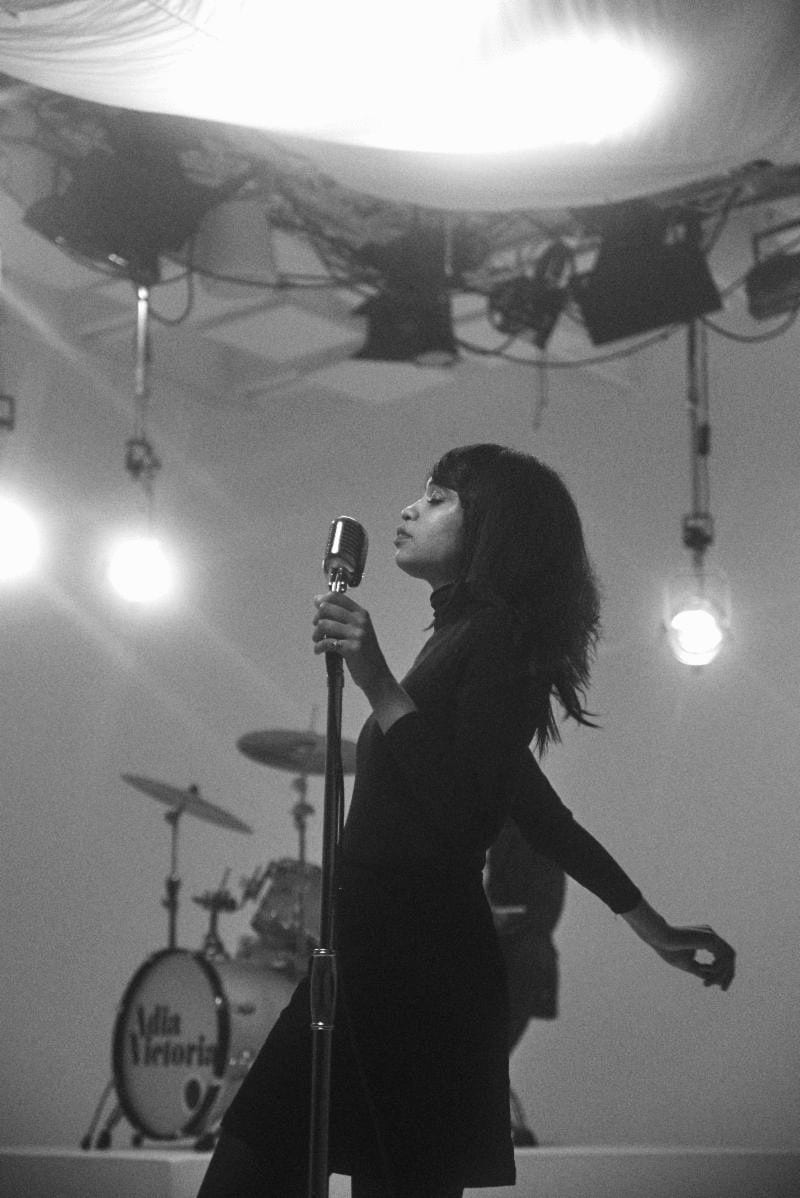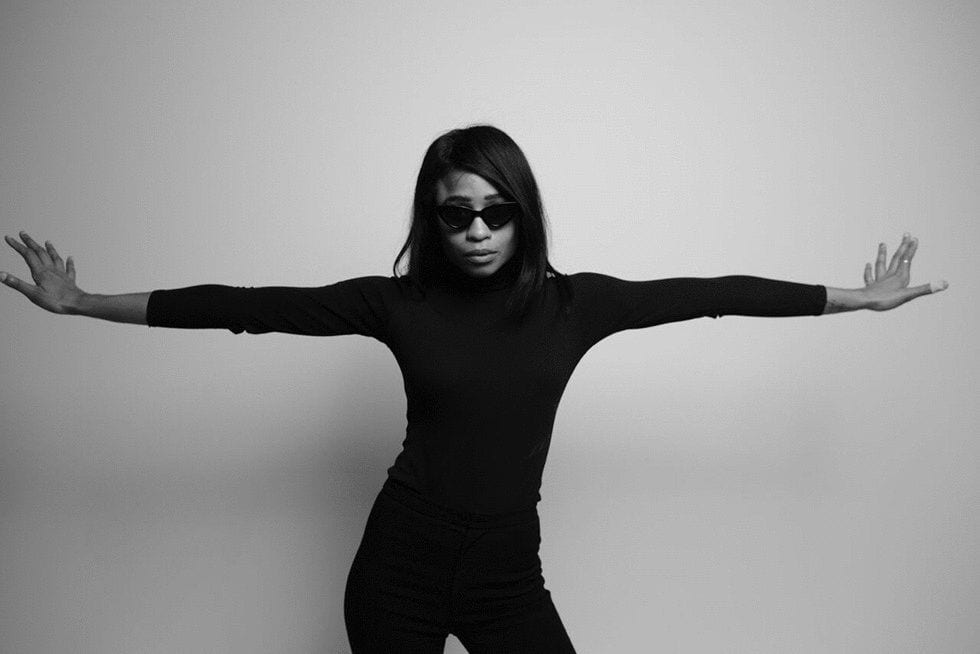
Adia Victoria always wanted to be heard. The problem was, no one seemed to be listening. Hence, the journey began for a young, black woman from the South who battled for truth, justice and a better American way of life.
She wanted to find a means to express herself, whether it required her voice or her pen. The exploration involving a kid raised by a religious family in South Carolina en route to becoming a blues musician living in Nashville — a city that’s seemingly less authentic than advertised during its heyday — has been a perilous one. But Victoria is a determined fighter, and is telling a personal story of survival ahead of Silences, her second full-length album, to be released on Friday, February 22.
The 12-song album, which she co-produced with Aaron Dessner (The National), is a remarkable achievement filled with lyrical and musical ambition while following the travails of a willful woman (“I like to do things my way / Or I don’t do ’em at all” is heard on “Heathen”) who takes on God and deals with the devil, getting worn down in the process. By “Get Lonely”, the tender ballad that serves as the final track, she’s just striving for that feeling of splendid isolation, as long as a lover is involved. It’s no coincidence that Victoria wrote all the words on the record, other than on “The City”, where she gets a co-writing credit.
The outspoken singer-songwriter-guitarist, who still tries to meet once a week in a poetry group with friends Caroline Randall Williams and Ciona Rouse, has already led a fascinating life during an endless search for belonging. Revealing many of her experiences during a phone interview from Williams’ home in Nashville on Valentine’s Day, she also was focused on the impending record release and the “Dope Queen Tour” that was about to begin, laughing that there was no time to celebrate the holiday with her boyfriend.

Asked what her expectations were for this album, her first full-length release since 2016’s Beyond the Bloodhounds, Victoria first joked about getting back on the road again, starting February 18 with six traveling companions. “I expect I’m gonna be in a van for a very long time. (laughs) I’m going to war. I’m preparing for battle.”
Victoria quickly took a seriously straightforward turn, though.
“I try not to put too many expectations on this experience these days because I want to be able, whatever it is that I come up against, that I meet and confront, I want to be appreciative of it,” she said. “I expect to put on a damn good show with my band. I expect us to have some very strange and interesting experiences out there on the road and I expect a lot of people to hear their own story on the album. Even parts of themselves that they don’t necessarily see spoken about in quote-unquote ‘polite society’. And that’s all I’ve ever wanted from this album was to kind of expand the conversation on things like mental health, the effects of capitalism on the human psyche, what it’s doing to us to constantly have to be on all the time.
“Like what happens at the end of the night when you lay your head down on the pillow. Who are you to you? Do you even know anymore?”
Victoria has constantly asked herself these questions over the years. The ongoing search to find her inner being has been fraught with tough times and stumbling blockades, but Victoria proceeds. If there’s a lifesaver in her past, it should be no surprise that it coalesced — eventually — through music. Discovering the blues and the ability to play guitar happened around the same time. But it took a while to get there.
An Early Discovery
Victoria’s pregnant mother was watching Sesame Street with one of her sons when she heard the name Adia on the show and fell in love with it. Finding out it meant “Gift from God,” in Arabic, she named her first daughter Adia Victoria Paul.
The child raised in “a very high-achieving family” of two older brothers and two younger sisters didn’t exactly stay the course when it came to going to school or church, though.
“I did not have the ability to just go along and get along for the greater good,” Victoria said. “And I wouldn’t be tamed in that regard.”
Growing up primarily in Campobello, a small South Carolina town in Spartanburg County south of Asheville, North Carolina, she didn’t relate to her fellow Seventh-day Adventists or the public school teachers.
“I didn’t believe the Scriptures that everyone around me did,” Victoria said. “And that troubled me because I wanted to. You know, you want to be a part of that community. You want to take the sacrament as well. You want to believe that there’s someone in the sky that’s looking out for you and has plans for you. But I didn’t. From a very young age … I could see the link between religion and the fear of adults. And I could see that they used religion as a way to hide from their own mortal condition, to hide from human truths that we all experience that no one should be afraid of, but they are. …
“And people are afraid; they’re terrorized enough about the thought of failure that they fall in line. And I was never able to fully fall in line. It made me feel like a fraud. … Eventually, you just accept the fact that this isn’t your flock. These aren’t your people.”
As a teen, Victoria did connect with the White Stripes (“Jack White was this white and red freak that I loved,” she said), but didn’t associate them with the blues. It took further exploration to get there.
Paris, New York, and the Black Keys
When Victoria became a high school dropout, she decided at the age of 18 to travel to Paris, which to this day leaves her wondering.
“How did you do that? Like, what the fuck?” she said to herself years later. “Again, it was just all that part of me where I didn’t feel like I belonged anywhere. So I went everywhere. I didn’t feel like the world expected anything from me, so I did everything I wanted. And I feel like there’s a lot of young people who feel lost in that regard.”
At 19, Victoria moved to New York “because I liked the Strokes,” she said. “And I was like, I want to go where they’re writing these songs and see where Julian Casablancas is writing the songs that mean so much to me.”
While still “trying to find some sense of community or belonging or someone that was strong enough and human enough to acknowledge and hold all of my parts,” Victoria instead found the blues.
She thinks she was 20 when she first heard “Your Touch” by the Black Keys being played in a vintage store. “And I thought, ‘Oh, that’s a nice song.’ And I thought Dan Auerbach was black. And I’m sure that would be the greatest compliment that anyone ever paid him.”
Plugging into the Blues
Realizing neither Auerbach nor White nor other white musicians invented the genre, Victoria delved deeper into America’s past to check out bluesmen like Junior Kimbrough and R.L. Burnside.
It was “the angry punk” inside her that awoke, thinking “about the political implications of the blues and how a lot of these black geniuses, like their art had been colonized and misrepresented as something that these white guys were doing. …
“Being from the South, from South Carolina, the blues were the first thing that I felt in my culture, my legacy, that I was plugged into. Like, I can claim this. This was for me. Like this speaks for me. Not them. Like this is mine, this is ours. And I kind of became obsessed with latching onto it. Like, this will save me.”
Finally, Victoria felt a sense of belonging. But another difficult transition awaited her.
A Lesson Worth Learning
After moving to Atlanta, Victoria saw opportunities dwindling and anxiety rising while possessing “that unfortunate combination of being black and Southern and poor and a woman.” She was a telemarketer, selling phone, cable, and internet for nine hours a day.
“I could see myself as an adult and I saw that I was gonna be very bored, and I’m very dangerous when I’m bored,” Victoria revealed. “I start doing things to amuse myself that are violent, illegal, dangerous.”
A friend who went to Seattle for the summer gave Victoria the keys to her Toyota Corolla to watch while she was gone. Victoria not only watched the car, she took it for thrill rides, lacking a driver’s license or any previous driving experience.
“I just started driving her car around I-75, crossing like six lanes of traffic while smoking a blunt,” Victoria offered. “Because I didn’t care. Like I didn’t feel anything, When you don’t feel anything, you do dangerous shit to make you feel something. So I did that. And I never even thought, ‘What would happen if a police officer pulled me over?’ “
Managing to avoid jail time or worse, Victoria made better use of another of her friend’s possessions — an old Washburn acoustic guitar.
Learning on her own how to play MGMT’s “Pieces of What” gave Victoria a sense of accomplishment. She was 21, years removed from a system that “told me that if I couldn’t get straight A’s,” then she was stupid. The guitar convinced her otherwise.
“I was just so tickled,” she recalled. “I felt like I had gained some key for some access to a secret place. And then after that, like, I realized that I’m capable of learning things. …
“Guitar allowed me to set my own parameters for success. It allowed me to be my own teacher, which I needed to be all along. It allowed me to set my own goals of what I wanted to achieve and what I wanted to learn.”
Listening to records by Skip James and John Lee Hooker, Victoria began learning to play the songs while pretending to sit on a porch alongside James or Robert Johnson, and “they were like some relative of mine that was teaching me, and I was able to go into this communal experience with these guys that had come before me and learned from them,” she said. “And I think that that made it a lot more relevant for me.”

“Write” of Passage
As intriguing as Victoria’s survival story is, there are more chapters to follow. The making of Silences, for example, started in 2016 after the release of her debut album and a long, exhausting tour to support it. In her bio, she said, “This album was the therapy that I needed to find that voice that had been silenced.”
First, though, this one-time “intentionally private person” dealt with a creative dry spell that involved staying away from the journal she had kept since high school and the guitar she had come to embrace.
“I couldn’t touch it. I think I was traumatized,” Victoria said. “And I don’t say that in a self-pitying way, but I say it in a way of like I was taken out of my comfort zone. I was doing high-pressure work for a long period of time with little breaks, and it was a complete break from my sense of strange normal that I had made for myself. And the thing is, like when it’s happening to you, you don’t even really see it happening.”
While still in a fragile state, Victoria began experimenting with percussive elements and trying to string together sentences to create what became the heart of a song. She also began reading books about female authors she has admired such as Virginia Woolf, Sylvia Plath and Toni Morrison.
“And I wondered where it was that these women were pulling from,” Victoria said. “And I was kind of like, ‘If they can pull from that place, surely I have that place within me, too.’ And I had to access that.”
Bringing Dessner aboard as co-producer, and recording in his isolated Hudson Valley studio north of New York City provided Victoria with a safe place where she could feel secure enough to play.
“I was able, for the first time, to unplug and engage these parts of myself that had shut down,” she said.
The two initially met after Dessner reached out to Victoria’s Canvasback label and expressed interest in participating on her next project. A year before initial tracking began, they held a pre-production meeting and worked on “Bring Her Back,” the no-holds-barred second song on Silences that seems to be a twisted take on reincarnation.
Starting with only Victoria’s voice and acoustic guitar, “we fleshed it out into this thing that I didn’t even know I had in me,” she said. The presence of Dessner was like having “another big brother” who allowed her to earn his trust. “He gave me a sense of community and a sense of belonging that I haven’t been able to find yet in Nashville,” Victoria added.
Going home again?
While she has lived in the Music City for about 10 years, and feels blessed to have members of her family — including her mother, grandmother, brothers, sisters and aunts — in town to provide support, Victoria is thinking about moving back to the South Carolina of her youth.
“It’s a good city for where I’m at in my life right now,” she said of Nashville, also mentioning that her band is there. “But, yeah, I think it’s kind of wearing on me these days. This city is tearing itself apart and kicking a lot of people out and bringing in a lot of not-so-nice people.”
So while preparing for an extended road trip might not sound like the most inviting part of a musician’s life, Victoria seems eager to share her story again — with audiences that will listen.
With a band that includes Mason Hickman (guitar), Jason Harris (bass), Timothy “Knapps” Beaty” (drums), Peter Eddins (keyboards) and horn players Chazen Singleton and Austin Wilhote (aka Willé), Victoria is looking forward to a performance including some surprise covers, while becoming “a lot more groove-based” act than it has been.
“It’s a lot more in touch with my blackness, my Southernness,” she added. “The show tells the journey of a young girl who goes from silence to finding her voice. … It’s a chance for people to see the continuation, the legacy of the blues and where it’s leading to, and all its beautiful, human blackness.”
That the voice that learned to speak out and belt the blues belongs to Victoria is not a coincidence, either. It deserves to be heard, especially since Silences is golden.

Adia Victoria Blasts the Grammys
Attending a ballet on February 10, the night of the Grammy Awards show, Adia Victoria missed the telecast but that didn’t stop her from sharing a few thoughts about the ceremony and the fallout from Recording Academy president Neil Portnow’s comments made a year ago.
Asked about Portnow imploring women “to step up” if they wanted to become successful in the music industry, Victoria said, “I understand the implications of it because these men have an inordinate amount of power over the careers of women, but at a certain point I’m not just fighting to be heard as a woman. I’m fighting to be heard as a black woman. … I can’t give it my energy because it’ll drive me crazy.”
Told that Dua Lipa, the winner of the Best New Artist award this year on a night when 15 women were nominated in the four major categories, took a subtle shot at Portnow during her acceptance speech, VIctoria offered, “I’m at the point where I’m just trying to prove to men like that that I’m fully human. So, of course, he said something stupid. I’m glad that he had his ass handed to him from women in the industry.”
Victoria was more moved by the speech Drake gave after his “God’s Plan” won for Best Rap Song. “I want to take this opportunity while I’m up here to just talk to all the kids that are watching this, aspiring to do music,” Drake said. “All my peers that make music from their heart that do things pure and tell the truth, I wanna let you know we’re playing in an opinion-based sport, not a factual-based sport. So it’s not the NBA where at the end of the year you’re holding a trophy because you made the right decisions or won the games.”
Victoria agreed, and applauded Drake’s comments.
“So, basically, don’t do it for academy recognition,” was Victoria’s takeaway. “Don’t wait around for the Record Academy president to give you a pat on the back and say you’ve stepped up. Like I don’t need him to tell me that. I don’t need a Grammy to tell me that I’m making worthwhile contributions to the world. I don’t need them.
“They’re very irrelevant in my book, as far as I’m concerned. And I think that people are starting to catch on. Like you saw a lot of major winners, they didn’t even bother to show up, like Childish Gambino. … Because they understand that these games that we unfortunately all have to participate in, they don’t mean anything. … It’s just an exercise in the absurd. Make your art, say your voice, play your story and keep moving. If you get a Grammy, cool. If not, who cares?”

